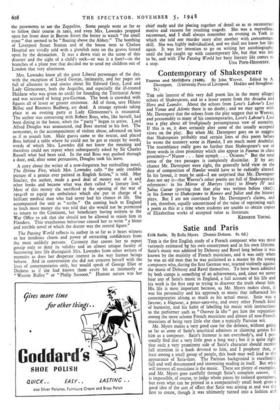Contemporary of Shakespeare
THE sole interest of this very dull poem lies in the many alleged echoes of Shakespeare, and to a lesser extent from the Arcadia and 'Hero and Leander. About the echoes from Love's Labour's Lost and Venus and Adonis there is no doubt ; and we may, agree with Mr. Davenport that the echoes from the play suggest that to Weever, and presumably to many of his contemporaries, Love's Labour's Lost was a play about aii-irreligiously presumptuous vow of austerity. If this is so, it does certainly alter some of the usually accepted views on the play... But when Mr. Davenport goes on . to suggest that Shakespeare probably read certain lines of this poem before he wrote the nunnery scene in Hamlet, I am much more doubtful. The resemblance really goes no further than Shakespeare's use of three words in close proximity which also appear in Faunus in close proximity—"Nunne . faire nymph . . . Orizons." But the total sense of the two passages is completely dissimilar. if by any chance Mr. Davenport were right, the generally held view on the date of composition of Hamlet would have to be radically altered. In his favour, it mustbe said—I am surprised that Mr.: Davenport does not say it—that Weever's other poems are full of Shakespearian references: in his Mirror of Martyrs (16o1) to Henry IV and 7ulius Caesar (proving that that play was written before 16ox) ; in his Sonnet to Shakespeare to Romeo and Juliet and the history plays. But I am not convinced by Mr. Davenport's claims, and I am, therefore, equally unconvinced of the value of reprinting such a poem as this at a time when students are unable to obtain copies of Elizabethan worki of accepted value as literature.
KENNETH YOUNG.










































 Previous page
Previous page